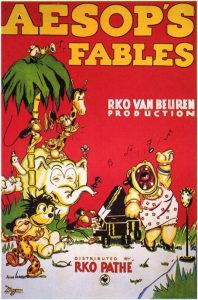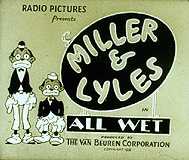 1932 is usually thought of as a year of formerly-wealthy bankers selling apples on street corners, bread lines, and soup kitchens. Yet, at the front offices of Radio Pictures, they seemed to be satisfied with what was being put out. This seemed to be especially true with regard to cartoons, now being produced nominally by “RKO-Van Bueren”. There appear to be no documents expressing disaffection from the distributors.
1932 is usually thought of as a year of formerly-wealthy bankers selling apples on street corners, bread lines, and soup kitchens. Yet, at the front offices of Radio Pictures, they seemed to be satisfied with what was being put out. This seemed to be especially true with regard to cartoons, now being produced nominally by “RKO-Van Bueren”. There appear to be no documents expressing disaffection from the distributors.
Live action also continued to flourish. Edgar Kennedy shorts were maintaining popularity, and the studio would even produce a 12-chapter serial, The Last Frontier (starring Lon Chaney Jr.). All things considered, things in general were reasonably well. So, as long as the suits were happy in the front office, it seemed like everything could continue going where it had been going.
Joint Wipers (4/23/32) – Tom and Jerry as plumbers, with gags that would be reused in both animation and live action. An original song, which I’ll call, “Oh, We’re Glad To Be Plumbers”, is performed by the boys, likely voiced by Les Reis and Artie Dunn.
Magic Art (4/25/32) – The shorter of two animal protagonists (is the taller one Waffles?) finds a pencil that can draw things that come to life. (This is an idea which would be reused later in the same year by Tom and Jerry, and, following the closing of the studio and John Foster’s reuniting with Paul Terry, would provide the plot basis for Gandy Goose’s The Magic Pencil). Gags and unexplainable insanity ensue. Songs: “The Doll Dance”, the first of a series of piano novelties penned by Nacio Herb Brown. Early recordings include Nat Shilkret ad the Victor Orchestra on Victor, Earl Burtnett and His Los Angeles Biltmore Hotel Orchestra for Columbia, Carl Fenton on Brunswick, a house band as the “Imperial Dance Orchestra” on Banner, Constance Mering and Muriel Pollack on Columbia, Pattman (an English organist) on British Columbia, Willie Creager’s Rhythm Aces on Electrobeam Gennett, Mike Markel’s Orchestra on Okeh, Lou Gold and his Orchestra on Harmony, and in England, Harry Bidgood and his Broadcasters on British Broadcast 8″. Revivals included Freddie Slack on Capitol, the Three Suns on Victor, Frankie Carle on Decca, Ken Wilson (Organ) and Bill Green (Piano) on Columbia, and Lawrence Welk on Coral. Also reappearing is “I Ain’t Got Nobody”.
Pots and Pans (5/14/32) – Tom and Jerry operate a lunch wagon. A quartet of customers sitting in a row at the counter order soup in harmony, before breaking into song. The lunch wagon eventually starts rolling downhill from where it was moored, and winds up on the railroad tracks, on a collision course with a fast express. The collision does occur, but the wagon continues to roll with the smashed engine atop, as the patrons finish up their song. Songs: “Cupid on the Cake”, a 1931 song more popular in Britain than in this country. A twinkly piano novelty to start with, it was recorded by Debroy Somers for British Columbia, and in big band style by Jack Hylton on HMV. It is suspected that neither version was issued here. “Mean Music” was a 1931 American song, not all that widely recorded. Gene Kardos recorded it for Victor, with vocal by Dick Robertson. Philip Brown’s Grosvenor Band issued a version on English Columbia.
Happy Polo (5/14/32) – A reissue of Paul Terry’s silent The Polo Match with added sound. Gags about polo balls bouncing off the bridge of horses’ noses. (Several ponies wind up seeing stars or tweeting birds. No problem – they’re only mechanical, as most Terry horses were, and no actual polo ponies were harmed in the filming of this production.) Songs: “The King’s Horses”, a 1930 British song that was also a hit here. Many will also remember the tune for its use in the opening of Laurel and Hardy’s 1931 Oscar winner, “The Music Box”. Jack Hylton’s British recording for HMV was issued here in Victor. The recording was made in Glasgow, where Jack’s band had traveled to perform at a song contest of a local newspaper. Ben Bernie cut it for Brunswick. Bert Hirsch and the Hit of the Week Orchestra recorded a cardboard version for Hit Of The Week, with Dick Robertson putting on a fake British accent. The Black Hawks (pseudonym for an unknown orchestra) issued a version on Broadway. Other English bands included Ray Starita on Columbia, Jay Wilbur on Imperial, and again on 8″ Eclipse as “The Biltmore Players”, and Marius B. Winter on Broadcast Twelve. “Business in F”, written by Archie Bleyer, also appears, and was recorded by Fletcher Henderson (issued under a pseudonym) for Columbia, Gene Kardos for Victor, and again by him under Dick Robertson’s name for Perfect, Banner, et al., and yet a third version for Crown under the name of his piano player, Joel Shaw.
Spring Antics (5/21/32) – That old blowhard, Old Man Winter, is blowing hard creating a snowstorm. Old Sol comes out, and begins melting the snow. Weather forecaster groundhog is letting everybody know that Spring is here. Fish are capering in the brook now that it isn’t frozen over. Yet some of the critters are racing to get the last of the snow fun before the season’s over. No love story or apparent villain – just a lot of seasonal gags. Songs: returns for “Mendelssohn’s Spring Song”, “Jingle Bells”, and a newcomer, “Spring Is Here Again”, recorded by the Dell Lampe Orchestra on Victor with vocal by Dick Robertson. (Lampe’s father had written such pieces as the rag “Creole Beles” (1901), and “Pizzicato Mysterioso” – the standard musical intro for every melodrama villain.) Marion Harris also recorded a vocal version in England for Columbia.
The Tuba Tooter (6/4/32) – Neither Tom nor Jerry seem to do much in this cartoon, which is mostly about a German band, with brass bass featured prominently. All the band members wind up in the Paddy Wagon, playing their oom-pah melodies all the way to the hoosegow. Songs: returns for “Ach Du Lieber Augustin” and “Oh Susanna”. “In Cellar Cool” (ala “Drinking”) was a vehicle for basso singers and trombone players. Recordings included Peter Dawson on G&T (Gramophone and Typewriter) in 1906, and Malcolm MacEachern (as “Drinking”), on English Columbia, which allows him to descend to low B-flat. MacEachern was the “Jetsam” of the popular duo, Flotsam and Jetsam. William MacDonald recorded a domestic acoustic version for Columbia. Oscar Natzke also performed it for British Parlophone. There were other British versions, some of which I am unsure as to whether credit is to a real singer or merely a pseudonym. The heavily-featured number of the cartoon is “Shultz Is Back Again”, which seems to have had only two recordings – Billy Jones on Edison Diamond Disc (a version close in style to the cartoon, with some comedy patter included), and The Four Aristocrats on Victor (quartet with piano, steel guitar, guitar, and uke), whose instrumentation gave the song a much different ambience that the usual German band sound.

This film was originally made and titled “All Wet” with the blackface vaudeville duo Miller & Lyles.
The Farmerette (6/28/32) – Spot gags down on the farm, as a seductive female farm applicant (voiced by one of the Betty Boop substitutes) gives the farm new pep – but everyone follows her when she leaves, singing “How Ya Gonna Keep ‘Em Down On the Farm?” Said song was from 1919, written in the aftermath of WWI about doughboys having no taste for farm life after seeing Paree. Arthur Fields got it for Victor, while Byron G. Harlan covered it for Edison. Nora Bayes followed on Columbia. The soundtrack also includes returns for “Turkey in the Straw”, “Reuben and Cynthia”, “Please Let Me Sleep”, “Some of These Days”, “The Old Gray Mare”, and “Way Down On the Farm” (in reused animation from “Farm Frolics”).
Next Time: 1932-33.


 James Parten has overcome a congenital visual disability to be acknowledged as an expert on the early history of recorded sound. He has a Broadcasting Certificate (Radio Option) from Los Angeles Valley College, class of 1999. He has also been a fan of animated cartoons since childhood.
James Parten has overcome a congenital visual disability to be acknowledged as an expert on the early history of recorded sound. He has a Broadcasting Certificate (Radio Option) from Los Angeles Valley College, class of 1999. He has also been a fan of animated cartoons since childhood.












































Thanks for identifying “Cupid on the Cake”, a tune I’ve always wondered about when watching “Pots and Pans”. The cornet soloist in that number, whoever he was, is outstanding.
Thanks also for identifying Archie Bleyer’s “Business in F”, which would later accompany the manic alcohol-fueled finale of Tom and Jerry’s “Doughnuts”.
The tune heard at the very beginning of “The Tuba Tooter” is the patriotic song “Die Wacht am Rhein”, a favourite of German choral societies in the nineteenth and early twentieth centuries. I’m having trouble imagining “Schultz is Back Again” arranged for steel guitar and ukulele, so I’ll have to see if I can find that Four Aristocrats recording. It sounds hilarious!
That Judy Garland recording of “How Ya Gonna Keep ‘Em Down on the Farm?” is from the soundtrack to the 1942 musical film “Me and My Gal”, co-starring Gene Kelly. It was just one of many WWI-era songs performed in that film. Personally I prefer the version sung in close harmony by sisters Betty, Doris and Gwen Brian in the “Our Gang Follies of 1936”, while Buckwheat gets chased around the stage by a monkey with a pitchfork.
1932 was, I think, Van Beuren’s richest year musically. Thank you for your efforts in tracking down these golden oldies, Mr. Parten. And with so many recent topics being ground zero for easily offended people, I won’t run any further risk of getting attacked.
I recognized the name of “Archie Gottler” on the “Spring Is Here Again” disc label. Didn’t he put out a series of musiical short subjects for Columbia around the middle ’30s? I think The Three Stooges did one of these in rhyme, THE WOMAN HATERS?
Archie Gottler directed “Woman Haters”, his first and only Three Stooges short. Story credit goes to Archie’s teenage son Jerome S. Gottler.
Archie also directed an earlier short, “Umpa” (1933) in the Musical Novelty series, which uses the same musical number as “Woman Haters”, :My Life, My Love, My All.” It is on YouTube.
Yes, Waffles is the tall cat, and Don is the short dog.
Could Van Beuren be the first animation studio to hire African-American actors to dub cartoon characters?
Maybe the Fleischer’s did it first with Cab Calloway?